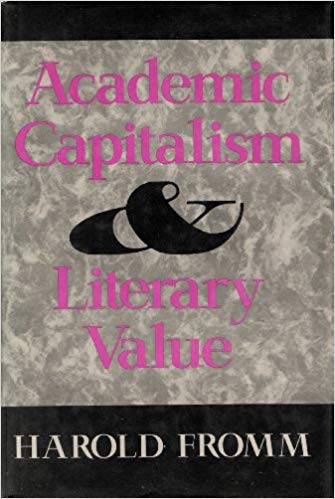The “free and open exchange of ideas” lies at the very heart of what was once called, in more innocent times, liberal education. These days, the American university is the last place to look for that unhindered flow of thought. Instead, as books like John Ellis’s Against Deconstruction, Dinesh D’Souza’s overstated Illiberal Education, Roger Kimball’s Tenured Radicals, and Richard Jacoby’s leftist critique The Last Intellectuals have pointed out, our academics have converted free inquiry into a quite costly commodity, measured by the coinage of political correctness and unavailable to the heterodox.
To these justly inflammatory books one must now add Harold Fromm’s Academic Capitalism and Literary Value, a harrowing look at the orthodox machine that now defines what takes place within humanities classes across the land. By his style, one would guess Professor Fromm to be a well-intentioned, bespectacled, somewhat musty political liberal of the kind once familiar to every college student. He is also fearlessly honest, unlike so many of his peers, and in these pages he fires on a wide field of deserving targets, ranging from so-called feminists to so-called Marxists to so-called deconstructionists, the last practitioners of a textual-critical doctrine I have elsewhere called “a non-theory compounded of topsy-turvy illogic, linguistic legerdemain, reductivist incantation, nihilistic obfuscation, blind francocentrism, and totalitarian impulse.”
These ever-fashionable men and women, writes Fromm, “operate in accordance with their own aggressive, sometimes covert, agendas.” The governing plank of the program, he rightly suggests—for which he will make countless enemies throughout the academic establishment—is the ancient principle of nest-feathering. For what the Marxists (Western universities, a current joke now has it, are the only places you’ll find Marxists who’ll live up to the name) and feminists and deconstructionists and minority-studies advocates want is not a rainbow-coalition literary canon, the dismantling of the dead-white-male tradition, or the equation of ancient Benin with Periclean Athens. No, what they want is tenure, advancement, such fame as it is possible for professors to acquire, and, above all, six-figure salaries.
Sad to say, they’re getting all these perquisites by biting ever so fiercely the hands that feed them; the august pages of the New York Review of Books and PMLA, flagship journals of the revolution-in-progress, resound with their howls. Fromm, for one, is sickened at the sight. “I do not see anything wrong with enjoying computers or jet planes or advancing in the academy,” he writes, “but I do see much to lament in the use of stylized moral jeremiads as coin to obtain yet a bigger share of the very spoils that are being denounced.” He then proceeds to puncture a range of current pieties, illustrating along the way how those academics who have made the loudest noises against the study of, say, Shakespeare or Dante have been quickly co-opted by their home institutions, offered deanships and department chairs in the wan hope, one supposes, that they’ll thereby retreat from the op-ed page and get back to the lectern.
In neat terminology, the favorite parlor game of academia, Fromm further suggests that because “selfinterest, success, and profit” are their final and overarching goals, our tenured radicals must be considered practitioners of academic capitalism, whence part of the title of his book. His book—a series of essays that hangs together to the bitter end—is jammed with cases in point, and he names names: Stanley Fish, Henry Louis Gates, Elaine Showalter, and other newly wealthy superstars of the Big Ten come under his increasingly withering gaze.
Fromm is angry. And well he should be, for the humanistic vision of the university, one that the good professor has devoted himself to, is more and more under the spell of intellectual-industrial production, a regime in which “literary study becomes just another social science, while novelists and poets appear as more cunningly unscrupulous versions of ourselves, using their gifts for the same grubby vanities as the rest of us.” Professor Fromm does not point out strongly enough that the logical result of this “academic capitalism” is the ever-greater irrelevance of the university to the general culture, and the loss to the humanities of a generation and more of promising students. What young man or woman with even a modicum of self-respect would, after all, ever want to join such a club?
What Harold Fromm has to say will come as no surprise to readers in regular contact with a college or university, as teacher or student or interested alumnus. But his revelations will surely distress those outside the immediate orbit of the academy, men and women who may fondly remember their journeys through Homer and Plato and Locke, the flotsam and jetsam of a shipwrecked canon. Any reader who comes to Fromm’s pages must be outraged at the willful destruction of scholarly tradition in the interests of Mammon, a vandalism Fromm richly documents. One hopes that his book will enjoy a wide circulation among legislators in charge of university appropriations, and that, hope against hope, as Fromm puts it, “these self-absorbed Laputans [of the academy will] be recalled from their narcissistic afflatus with periodic Swiftian slaps in the face.”
[Academic Capitalism and Literary Value, by Harold Fromm (Athens: The University of Georgia Press) 281 pp., $35.00]

Leave a Reply